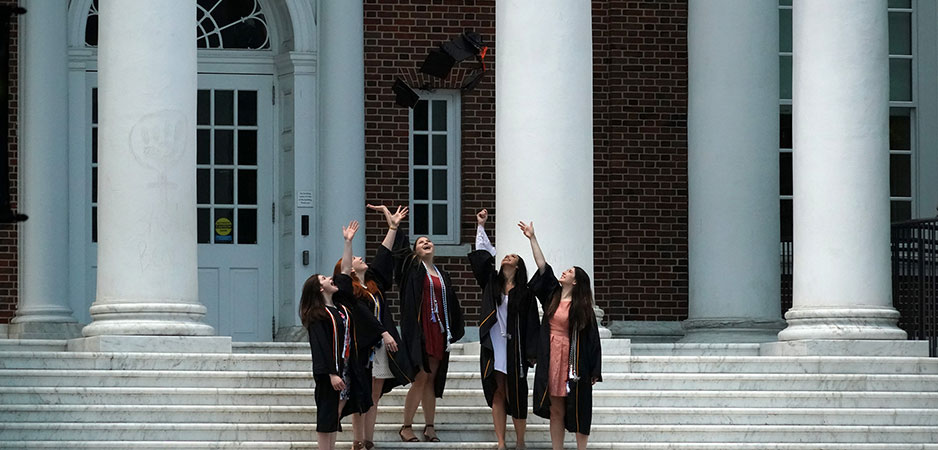American universities are among the best in the world. Harvard, Stanford, MIT and Yale, to name but a few, attract the best and the brightest of their generation, year after year. The competition is brutal. Most applicants are rejected. American universities, however, are not only among the best in the world — they are also among the most expensive. A non-resident student at one of the top public universities, such as UCLA, Berkeley or the University of Virginia, pays more than $150,000 for a four-year undergraduate degree. A professional master’s degree, such as business or law, costs you well over $100,000 a year. No wonder that higher education has become a multibillion-dollar quasi-corporation, with university presidents behaving — and being remunerated — like CEOs.
Until COVID-19, business was booming. The pandemic, however, has thrown a monkey wrench into the works, and university administrators are at a loss of how to respond to the crisis. The problem is that as higher education in the United States morphed into big business, it increasingly reached out beyond America’s borders, actively seeking to recruit international students. Last year, for instance, there were some 90,000 German students enrolled in American universities. Their numbers pale, however, in comparison to Chinese students, who in recent years amounted to over 350,000. Universities love foreign and non-resident students if only because more often than not they pay full tuition.
Up in the Air
The combination of COVID-19 and Trumpian nativism poses a serious threat to this arrangement. As the pandemic spread across the nation, universities were forced to close their doors and go online. And with the pandemic threatening to engulf the whole nation, largely thanks to the administration’s incompetence and utter lack of preparedness and empathy, the immediate future of higher education is completely up in the air. Foreign students are in the United States on a visa that requires them to pursue their degree at a (physical) university. As universities become virtual, switching to online teaching, this no longer applies, or so Immigration and Customs Enforcement (ICE) announced in early July.
This meant international would be required to leave the country or face deportation. Immigration suggested that international students whose university moved online consider transferring to another university that still offered in-person instruction – under the circumstances a rather ridiculous proposition. In any case, ICE announced that the Department of State would no longer “issue visas to students enrolled in schools and/or programs that are fully online for the fall semester” nor would immigration authorities “permit these students to enter the United States.”
Student Visa Debacle: All One Needs to Know About Trump’s Presidency
In response, a number of major private and public universities filed a lawsuit against the federal government over the measure. In the days that followed the administration reversed course, admitting the “proposal” had been “poorly conceived and executed.” This, however, failed to smooth the waves of academic indignation. On July 14, the president of MIT, Dr. L. Rafael Reif, wrote an op-ed in The New York Times, in which he claimed that America needed foreign students. Foreign students, he charged, were essential for American competitiveness and innovation. “As a nation,” he maintained, “when we turn our backs on talented foreign students, we not only lose all that they bring to our classrooms and laboratories, we also give up a strategic asset.”
To illustrate the point he chose as an example Chinese PhD students — not particularly felicitous given the current anti-Chinese sentiments prevalent in America today. Most recent data showed, he wrote, “that 83 percent of Ph.D. students from China, the kind of highly trained scientists and engineers who drive American innovation, were still in the United States five years after completing their degrees.”
The Resentment of the Privileged
The New York Times allows its readers to comment on op-ed pieces. It is difficult to know if Reif was prepared for some of the responses he got from his readers. Quite a number of commentators questioned the MIT president’s motives behind his defense of foreign students, and particularly Chinese students. Others insisted that American students should get preference. Others charged that foreign students were “squeezing out” qualified American applicants for the simple reason that American top universities put them in a position to do so. Undoubtedly, resentment transcends class boundaries.
There are, however, good grounds for this resentment. One of the most burning socioeconomic issues today is inequality. COVID-19 has once again drastically shown that inequality is a multidimensional phenomenon, related to a range of markers — gender, race, class and particularly education. Take, for instance, “assortative mating,” which refers to the tendency of people to choose a partner with a similar background, such as education level. Studies show not only that assortative mating has steadily increased over the past decades, but also that it has a non-negligible impact on socioeconomic inequality.
It has also been shown that parents’ education level has a significant impact on their child’s educational attainment. Children from families where the parents are highly-educated are more likely to succeed in high school, more likely to attend and graduate from university and more likely to get a well-paying job. In this way, inequality is passed on to the next generation.
A second reason for the resentment expressed by some of the comments in The New York Times is probably more mundane, more “human, all too human.” Top American universities are the incubator of America’s elite, similar to Oxbridge in the UK and the grandes écoles in France. With top universities seeking to attract foreign students, there are fewer spaces from the “native-born.” Given the profile of the average reader of The New York Times, the resulting resentment is quite understandable. Nativism is usually associated with “ordinary people” having to compete with migrants for scarce resources such as social welfare.
This does not mean, however, that the privileged are immune to nativism. And the resentment of the privileged is bound to increase in the years to come. Until now, highly educated professionals in the West were largely protected against international competition. Studies suggest that COVID-19 is going to boost trade in services. The acceleration of trade in services, in turn, is likely to affect a range of professional services — finance, consulting, accounting, legal services, even medicine — hitherto shielded from international competition. Under the circumstances, the resentment of the highly educated is perfectly understandable. Foreign students from China and India at Harvard and MIT are the likely competitors of their offspring a few years ahead. And they are likely to win the race.
Luxury Good
It appears American higher education is in a pickle, some of its own making, some not. The reality is that higher education has become a luxury good in the US. For most Americans today, college education represents the second-largest expense after buying a home. Over the past three decades or so, tuition costs have more than doubled, in some cases significantly more. One of the reasons has been deep cuts by states for higher education, particularly in the wake of the Great Recession: Since 2008, tuition and fees in four-year public schools increased on average by more than 30%.
At the same time, however, universities are also to blame. One of the main reasons for the spiraling costs of higher education is the dramatic expansion of university bureaucracy. In the years following the Great Depression, and state funding cuts notwithstanding, administration costs skyrocketed. According to Forbes, between 1980-81 and 2014-15 school years, administrative costs at private and public schools increased from $13 billion to $122.3 billion. During the same period, instruction costs increased from $20.7 billion to $148 billion. In the process, the number of administrators has steadily risen largely outpacing the hiring of full-time faculty. In fact, in today’s universities, a significant part of the teaching is done by part-time faculty more often than not paid a pittance — around $3,000 per three-credit course.
As has been the case in so many other areas, COVID-19 has brutally exposed the complete lack of awareness of what is happening in the “real” world and of preparedness for contingencies on the part of those supposed to be in charge in higher education, namely its highly remunerated administrators. In a recent scathing critique in The Chronicle of Higher Education, a Johns Hopkins University professor has released all the pent-up anger that has accumulated over the years: “Even as they continue enriching themselves,” he charges, “university executives have revealed themselves ineffective in one of the most basic corporate responsibilities: managing financial risk. In a few short weeks, astonishingly wealthy institutions across the country were reduced to slash-and-burn strategies to maintain their solvency. Having consolidated power in their hands over the last generation, leaders of America’s wealthiest universities lacked financial reserves — while also squandering the reserves of their communities’ trust and goodwill.”
The professor’s ire is understandable, given the heavy losses Johns Hopkins has projected it will incur as a result of the pandemic and its impact on its faculty. The university expects losses for the next fiscal year to amount to more than $350 million, partially to be met by cutbacks. In addition to restrictions on new hiring, the possibility of furloughs and even layoffs, the president of the university announced that JHU would suspend the university’s contributions to individual retirement accounts — for all practical purposes amounting to a pay cut.
COVID-19 marks a rude awakening for America’s premier universities, laying bare all the problems associated with the “corporatization” of the institution of the university and “the monetization of just about everything within the institution” that are at the root of their current predicament. Under the circumstances, the MIT president’s op-ed piece is understandable. It certainly won’t fix the system of higher education.
The views expressed in this article are the author’s own and do not necessarily reflect Fair Observer’s editorial policy.
Support Fair Observer
We rely on your support for our independence, diversity and quality.
For more than 10 years, Fair Observer has been free, fair and independent. No billionaire owns us, no advertisers control us. We are a reader-supported nonprofit. Unlike many other publications, we keep our content free for readers regardless of where they live or whether they can afford to pay. We have no paywalls and no ads.
In the post-truth era of fake news, echo chambers and filter bubbles, we publish a plurality of perspectives from around the world. Anyone can publish with us, but everyone goes through a rigorous editorial process. So, you get fact-checked, well-reasoned content instead of noise.
We publish 2,500+ voices from 90+ countries. We also conduct education and training programs
on subjects ranging from digital media and journalism to writing and critical thinking. This
doesn’t come cheap. Servers, editors, trainers and web developers cost
money.
Please consider supporting us on a regular basis as a recurring donor or a
sustaining member.
Will you support FO’s journalism?
We rely on your support for our independence, diversity and quality.






